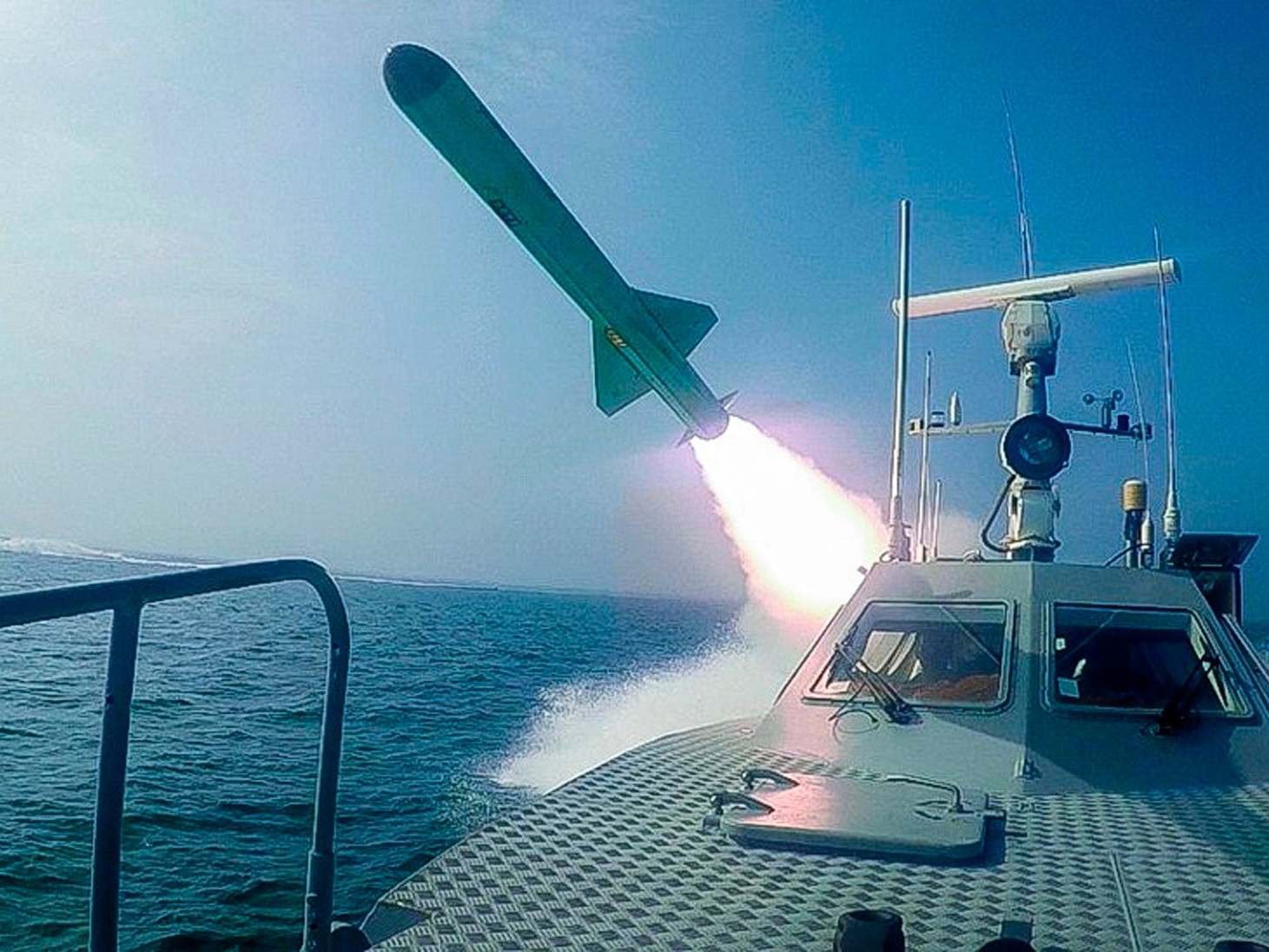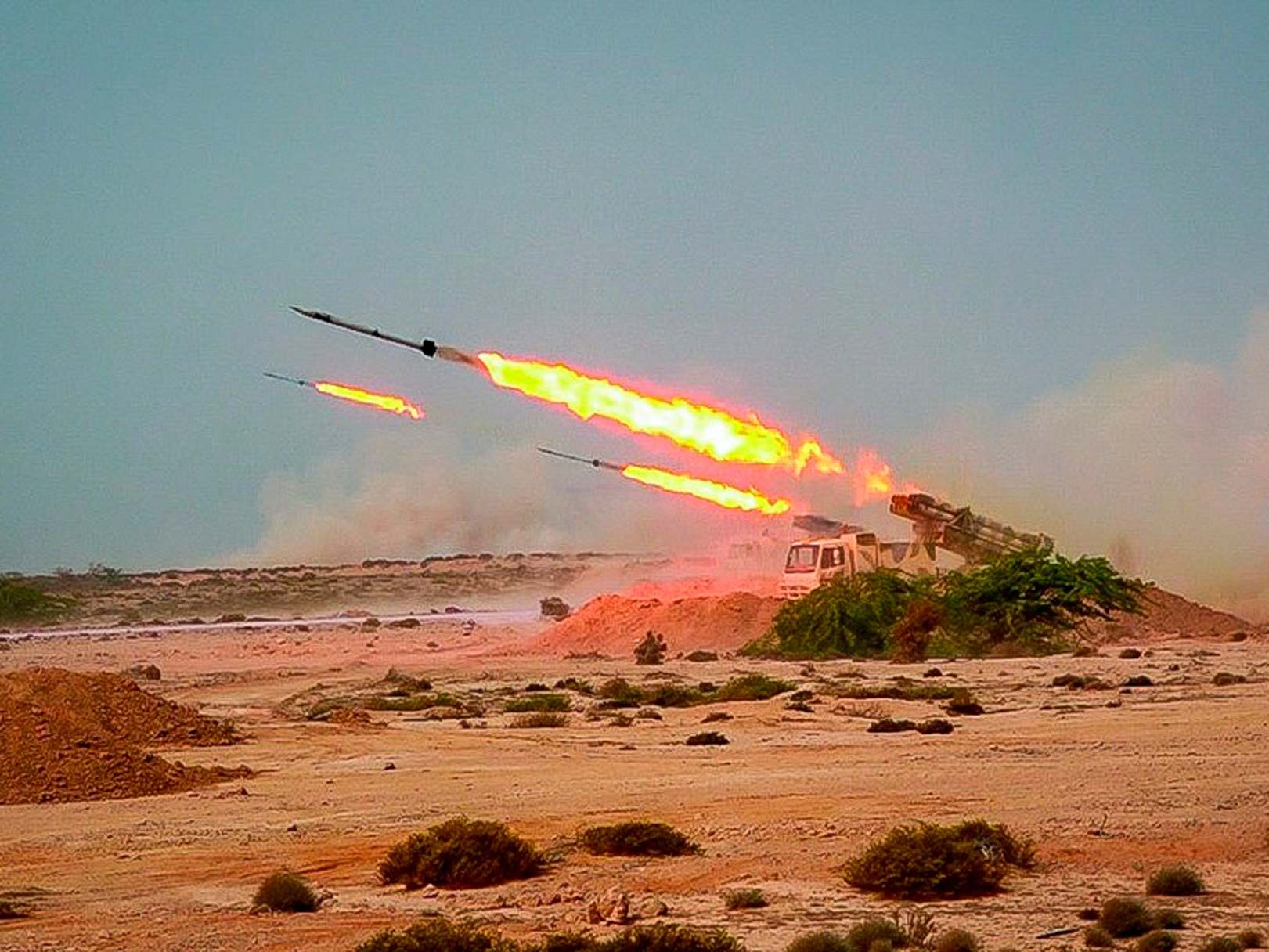Despite muscle-flexing, Iran is likely to avoid confrontation with Trump
Spectacular destruction of a model US aircraft carrier in Persian Gulf – called ‘reckless’ by the American military – is likely designed to placate Iran’s own hardliners, reports Borzou Daragahi


Iran’s Revolutionary Guard is conducting one of its periodic military exercises in the Persian Gulf – hammering a model of a US battleship with rockets and missiles in what could be seen as a warning to Washington amid rising tensions in the waning months of President Donald Trump’s first and possibly only term.
The final stage of the so-called Great Prophet 14 naval exercises near the crucial Strait of Hormuz gateway to the Persian Gulf coincided with attacks on two Iraqi bases housing American troops, rockets which were most probably fired by Iranian-aligned militias.
No doubt many Iranian officials are still smarting from the January assassination of Quds force commander Qassem Soleimani, and pressure is building on Iranian officials over a series of mysterious explosions targeting nuclear, missile and industrial sites in Iran.
But while there is no shortage of hotheads within the Iranian security apparatus willing to take risky gambits, there also appears to be a measure of restraint.
Footage on Tuesday showed Iranian boats circling the replica and commandos swooping down on it from a helicopter. US officials criticised the exercise.

“We are always watchful of this type of irresponsible and reckless behaviour by Iran in the vicinity of busy international waterways,” US Fifth Fleet spokesperson Rebecca Rebarich told Agence France-Presse.
But Iranian state media has also played down the exercise in the Gulf; it was the western satellite monitoring service Aurora Intel that reported on the dummy Nimitz-class US aircraft, not Iranian media.
No grandiose speeches have accompanied the exercise. More likely than not such stunts are meant to placate hardliners while regime strategists map out longer term goals.
“The exercises that Iran conducts in the Straits and in the Gulf of Oman are pretty routine,” said Jack Watling, a researcher at the Royal United Services Institute. “They follow a fairly common pattern, and it usually involves a spectacular demolition of an object replicating a US aircraft carrier, Most of it is for Iranian domestic consumption.”
Despite Iran’s economic troubles and tensions with the Trump administration, experts say powerful elements within the Iranian establishment are attempting to maintain the current relatively placid state of affairs, with several goals in mind.
One is the upcoming expiration of a decade-old ban on Iran’s purchase and sale of conventional weapons, an incentive tucked into the 2015 nuclear deal which the US abandoned in 2018. Iran is eager to be on its best behaviour to keep the UN Security Council from extending it. Indeed, US Iran envoy Brian Hook is scrambling around the world – visiting rotating security council members Tunisia and Estonia – in an attempt to drum up support to extend the arms ban from a sceptical world come October.
“If we’re at a major escalation point military it will be politically much more difficult for the Europeans to push back heavily against a US move,” said Ellie Geranmayeh, at the European Council on Foreign Relations. “If there is a heated militarisation of the situation, that factor will be on the back of people’s mind.”
Another factor keeping Iran in check could be a desire to stay in the good graces of China, which has been cosying up to Iran. Diplomats say Beijing is advising Tehran not to do anything provocative that could trigger a crisis that could bolster the re-election prospects of Mr Trump, whom China wants gone.
China’s leadership has been strengthening its strategic ties with Iran, penning recent military deals and a 25-year $400bn energy partnership, according to OilPrice.com.
Iranians strategists also don’t want to do anything to either help Mr Trump get re-elected or damage prospects for a deal with a possible Joe Biden administration. The presumptive Democratic Party nominee has repeatedly signalled he wished to de-escalate tensions with Iran and return to the 2015 nuclear deal should he be elected in November.
“They need to keep the door for diplomacy open for a Biden administration and not take such a conformational environment that boxes Biden in during the campaign and January when he takes office,” said Ms Geranmayeh.
Ms Geranmayeh predicted hawks in Washington and Israel may “throw everything but the kitchen sink” at Iran in the months leading up to the election and perhaps afterward in an attempt to provoke an Iranian response and scuttle prospects of diplomacy.
Fake American ships aside, Iran maintains real firepower in the Gulf that could hurt the US and its allies. “Iran has a huge capacity for escalation,” said Mr Watling. “Mining [the Gulf] is the most damaging. It will drive up insurance costs and bring shipping to a halt.”

Iran’s ballistic missiles remain a dire threat to Gulf cities and infrastructure as well as US personnel. “The increase in accuracy the Iranians have achieved means that they really don’t need to fire as many to do really catastrophic damage,” he said.
But perhaps more so than other ideologically fervent countries, Iran is also cautious about the use of violence, especially when it comes to the US.
“They don’t necessarily see that forcing an international crisis will lead to negotiations over the issues they would like to see discussed,” said Mr Watling. “In the lead up to US elections ... the consequences of an Iranian attack would be unpredictable. It’s hard to see how they would translate any kinetic actions into any tangible benefits.”
Join our commenting forum
Join thought-provoking conversations, follow other Independent readers and see their replies
Comments